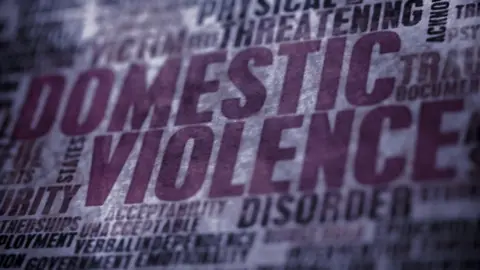Domestic violence laws will go through Stormont, not Westminster
 Getty Images
Getty ImagesLegislation to combat domestic abuse in Northern Ireland will go through Stormont and not Westminster, the justice minister has said.
The new laws will make coercive control, such as behaviour that amounts to "psychological, emotional or financial abuse", a criminal offence.
Naomi Long said she would bring the legislation through the NI Assembly.
The minister had previously said she was "still considering" the best route to progress the laws.
She said there were "advantages and disadvantages" to both routes, with some debate over whether the laws could be brought in place quicker through Westminster.
On Thursday, Stormont's justice committee was told if the assembly took back control, it might be the "autumn or beyond" before it came into law.
Mrs Long had said it was a priority for people in Northern Ireland to be able to "attend committee hearings, give evidence and challenge any draft legislation" and that it would be "more convenient" to have Stormont take forward the new laws.
Now, she has confirmed the legislation will go through the assembly.
'Much more insidious'
The laws will make it an offence for a person to engage in a course of abusive behaviour (on two or more occasions) against someone they are personally connected to.
The justice minister said it would "send a clear message that domestic abuse in all its forms, including both physical and non-physical controlling and abusive behaviour, is wrong".
"The new offence will recognise that domestic abuse is not only physical but can be much more insidious," she said.
"For many, for too long this has been a hidden problem.
"We can, and will, bring it out into the open and shed light on what can often be a dark secret."
 PA Media
PA MediaThe Department of Justice said the legislation would "close a gap in the law around patterns of abusive behaviour, allowing the criminal justice system to better protect victims".
It will also give the courts new powers for increased sentences for offences involving child victims.
Police figures released last October showed domestic abuse crimes were running at record levels in Northern Ireland.
They have risen by 12% in a year to 17,251, the equivalent of 47 per day.
Last year, there were calls for Northern Ireland to be included in new Westminster legislation on domestic abuse covering England and Wales.
Justice committee chairman Paul Givan said: "The assembly is best placed to carry out this important work and I look forward to carrying out the important scrutiny role, in a timely manner, when the legislation comes forward."
